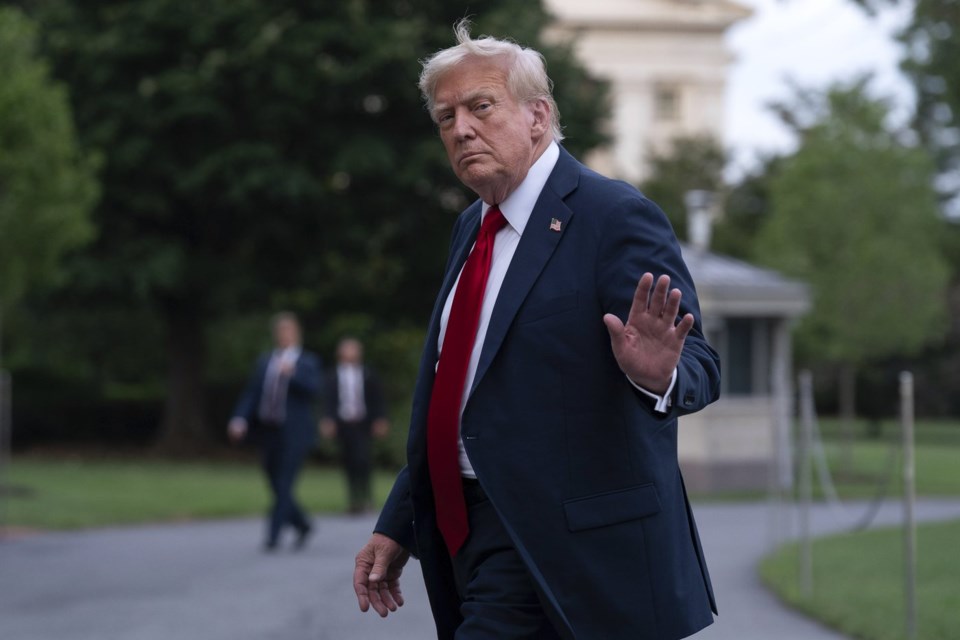WASHINGTON — Amid months of tariffs and taunts from U.S. President Donald Trump, a new poll suggests the percentage of Canadians who have a favourable view of the United States has fallen and is now on par with the number who think positively about China.
The survey by the Pew Research Center suggests one-third of Canadians — 34 per cent — now have a favourable view of the United States. It marks a 20 percentage point decrease from last year.
The same percentage of Canadians had favourable views of China — a 13 point increase.
"For the last few years … many people have preferred the U.S. to China by a sizable margin,” said Laura Silver, associate director of global attitudes research at the Washington-based research centre.
Now, she said, "there's no daylight between the two."
Pew polled people in 25 countries and the survey found positive views of China increased in more than half the nations. There was also an increase in people who viewed Chinese President Xi Jinping favourably.
"This is the first real tick up that we've seen that we would describe as an increase across the board," Silver said.
Trump returned to the White House with an agenda to realign global trade and upend geopolitics by targeting friend and foe alike. Critics of Trump's tactics have said the ongoing instability will push countries to form closer ties with China.
Canada was an early target with Trump repeatedly calling former prime minister Justin Trudeau "governor" and insisting Canada should become a U.S. state.
The president hit Canada and Mexico with duties he linked to fentanyl trafficking in March, only to walk back the tariffs for goods that comply with the Canada-U.S.-Mexico Agreement on trade a few days later.
Trump took his trade war to the world in April with so-called "reciprocal" tariffs but paused the devastating duties a few hours later saying it would give time for countries to make a deal with America. He kept in place a 10 per cent tariff for most countries.
China was hit by the hardest duties, prompting a brief but escalated tariff standoff between the world's two largest economies.
The U.S. president has been sending out letters to nations suggesting they will be hit with high duty rates if no deal is made by Aug. 1.
Trump did go ahead with specific tariffs targeting steel, aluminum and automobile imports, with copper duties also set to come into place on Aug. 1.
Pew, a non-partisan think tank, surveyed 28,333 adults across 24 countries – not including the United States – from Jan. 8 to April 26 by phone, online and in person. The centre also surveyed 3,605 Americans from March 24 to March 30 by phone, online and in person.
The poll reports 26 per cent of all people surveyed said they had confidence in the Chinese president, while 22 per cent said the same for Trump.
"That reflects both a rising view of Xi and a quite dramatically negative view of Trump," Silver said.
The changing views were especially stark in Mexico, where 45 per cent of people said it's more important for their country to have strong economic ties with China than with the U.S. — up from 37 per cent in 2019 and 15 per cent in 2015.
Canada’s relationship with China was roiled during the first Trump administration when in 2018 Canadians Michael Spavor and Michael Kovrig were taken into custody in China. It followed the arrest of Huawei's chief financial officer Meng Wanzhou in British Columbia at the request of the United States.
Silver said the 2025 polling is the first time there hasn’t been a wide gap in how Canadians view the world’s two largest economies since the relationship with China took a "nosedive."
The Pew Research Center survey found the share of Canadians who said the U.S. was more important for economic ties had dropped to 67 per cent from 87 per cent in 2019.
"Now, while it's still a majority, it's down more than 20 percentage points with a corresponding rise in the share who prefer China," Silver said.
This report by The Canadian Press was first published July 15, 2025.
Kelly Geraldine Malone, The Canadian Press



